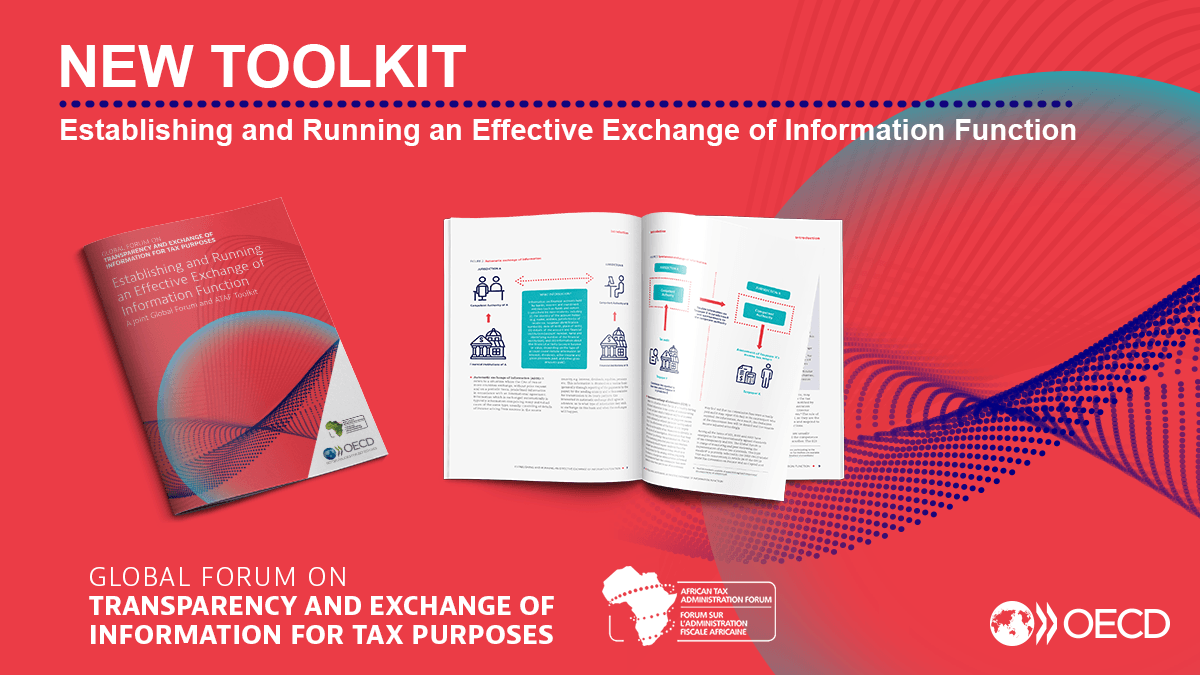Global Forum Secretariat and African Tax Administration Forum deliver new toolkit to help countries set up and run effective exchange of information units
African Tax Administration Forum • December 14, 2020

14/12/2020
–
In line with their respective mandates, the Global Forum on Transparency and Exchange of Information for Tax Purposes (the Global Forum) and the African Tax Administration Forum (ATAF) are jointly publishing a new Toolkit for Establishing and Running an Effective Exchange of Information Function.
Exchange of information (EOI) among tax administrations has dramatically improved over the past ten years. It has proven very effective in the fight against tax evasion and other illicit financial flows. EOI is well established as an important function of tax administrations. Its effectiveness largely depends on the organisation, procedures, resources and processes in place to run it. Setting up a well-resourced EOI function is therefore one of the starting points to be considered by ministries of finance or tax administrations when building an EOI system.
The toolkit is aimed at assisting countries in establishing or improving their EOI units’ operation. It underlines policy considerations and provides guidance on setting up and managing an effective EOI function in order to improve co-operation among tax administrations and better tackle tax evasion. Tax administrations will find practical answers to the frequent questions asked by jurisdictions along the EOI journey.
The COVID-19 pandemic has brought renewed attention to the role and importance of multilateral co-operation in combating tax evasion and helping domestic resource mobilisation. The toolkit builds on this years’ experience and highlights the need for a business continuity plan to maintain the EOI function to the extent possible during a crisis. Welcoming its publication, the Chair of the Global Forum, Ms María José Garde, noted that “the Global Forum Secretariat has turned the COVID-19 crisis into an opportunity to deliver specific products such as toolkits to meet the ever-increasing demand for capacity building.”
According to Mr Logan Wort, Executive Secretary of ATAF, “ATAF is working overtime in ensuring that EOI becomes a top priority of African tax administrations which should ultimately lead to increased revenue collection. In putting together this Toolkit, we are effectively equipping our members with a comprehensive and practical set of guidelines to enhance their EOI efforts.”
ATAF and the Global Forum have a longstanding relationship, working together to promote transparency and EOI for tax purposes in Africa. ATAF is an observer to the Global Forum and its key technical partner in Africa. It actively participates in the Africa Initiative
since its inception.
Since 2016, the close collaboration between ATAF and the Global Forum includes helping African countries identify gaps in their legal frameworks with respect to the international standards and the practice of transparency for tax purposes. Their joint actions are helping countries find appropriate solutions to close those gaps and build up the needed infrastructure to use EOI as a driver of domestic resource mobilisation.
------------------------------------------------------------------------------------
For further information on the toolkit, please contact Mr Pascal Saint-Amans, Director of the OECD Centre for Tax Policy and Administration: pascal.saint-amans@oecd.org, Ms Zayda Manatta, Head of the Global Forum Secretariat: zayda.manatta@oecd.org, or Mr Logan Wort, Executive Secretary, African Tax Administration Forum: lwort@ataftax.org.
For media inquiries, please contact Mr Julien Dubuc, Communications Officer, Global Forum: julien.dubuc@oecd.org
or Mr Romeo Nkoulou Ella, Manager Media and Communications, African Tax Administration Forum: rnkoulouella@ataftax.org.










